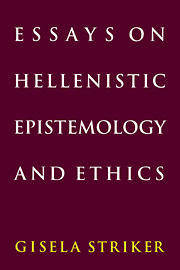Book contents
- Frontmatter
- Contents
- Preface
- Acknowledgments and essay sources
- List of abbreviations: Frequently cited names and titles
- EPISTEMOLOGY
- ETHICS
- 8 Greek ethics and moral theory
- 9 Ataraxia: Happiness as tranquillity
- 10 Epicurean hedonism
- 11 Origins of the concept of natural law
- 12 Following nature: A study in Stoic ethics
- 13 The role of oikeiōsis in Stoic ethics
- 14 Antipater, or the art of living
- 15 Plato's Socrates and the Stoics
- Name index
- Index of passages cited
15 - Plato's Socrates and the Stoics
Published online by Cambridge University Press: 05 June 2012
- Frontmatter
- Contents
- Preface
- Acknowledgments and essay sources
- List of abbreviations: Frequently cited names and titles
- EPISTEMOLOGY
- ETHICS
- 8 Greek ethics and moral theory
- 9 Ataraxia: Happiness as tranquillity
- 10 Epicurean hedonism
- 11 Origins of the concept of natural law
- 12 Following nature: A study in Stoic ethics
- 13 The role of oikeiōsis in Stoic ethics
- 14 Antipater, or the art of living
- 15 Plato's Socrates and the Stoics
- Name index
- Index of passages cited
Summary
It is no novelty to say that the Stoics saw themselves as followers of Socrates. According to Diogenes Laertius (7.2), Zeno turned to philosophy after reading the second book of Xenophon's Memorabilia. The Socratic descent of the Stoics was canonized into a school genealogy by the Hellenistic historians, who constructed the “succession” Socrates – Antisthenes – Diogenes – Crates – Zeno. As far as this suggests that each of the older philosophers was in some formal sense a teacher of the next, this is probably an exaggeration. However, it is easy to find typically “Socratic” doctrines in Stoic ethics – such as, for example, the conception of virtue as a kind of knowledge with its corollary, the denial of akrasia; the thesis of the unity of the virtues, and also, at least on one common ancient interpretation of Socrates, the notorious thesis that virtue is identical with happiness. But the genealogy also seems to indicate that the Stoics' Socrates was not, or not primarily, Plato's Socrates, but rather the Socrates of Antisthenes and the Cynics, or possibly Xenophon's. And indeed the Stoic system looks at first sight so different from what we seem to find in Plato's early dialogues that one might be inclined to think that the Stoic version of Socratic doctrine had very little to do with the Socrates of those dialogues. This may be the reason why recent studies of Stoic philosophy have tended, in the absence of extant texts by the major Cynics, to concentrate on the influence of Aristotle rather than Plato as a philosophical predecessor of Stoicism.
- Type
- Chapter
- Information
- Essays on Hellenistic Epistemology and Ethics , pp. 316 - 324Publisher: Cambridge University PressPrint publication year: 1996
- 2
- Cited by



